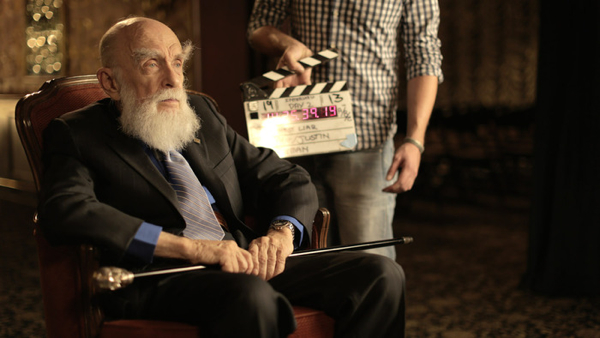Movie review by Greg Carlson
Legendary magician and fraud investigator James “The Amazing” Randi is the subject of Tyler Measom and Justin Weinstein’s engrossing biopic “An Honest Liar.” Covering Randi’s extraordinary life from his early years in Toronto to his more recent decision to speak publicly about his homosexuality, “An Honest Liar” seamlessly integrates a trove of mediated sound and vision from Randi’s long tenure in the spotlight. Measom and Weinstein also interview a key group of Randi associates, including several celebrity admirers as well as Project Alpha moles Steve “Banachek” Shaw and Michael Edwards. They also gain unprecedented access to their subject, now a sprightly octogenarian whose signature snow white beard, stooped posture, and reliance on a cane call to mind a wild and wizardly Yoda-Gandalf mashup.
Randi initially patterned himself on hero Harry Houdini, mimicking several of the famous escape artist’s well-known stunts before shifting a great deal of his time and energy to challenging and debunking a series of phonies who claimed to be endowed with telekinetic and supernatural powers. Randi’s bracing, no-nonsense attitude about the importance of not falling prey to flimflam conmen shaped the course of the man’s career. Randi’s relentless skepticism, made famous by the unclaimed One Million Dollar Paranormal Challenge prize, makes for highly entertaining TV confrontations but is also taken seriously enough to assume the quality of a campaign for justice and rationality.
A fixture of television for decades, Randi has chatted with Bill Maher, Penn & Teller, Oprah Winfrey, Larry King, Anderson Cooper and many others. He has turned up on everything from “Happy Days” to “Nova” to “Today.” His more than thirty appearances on “The Tonight Show” with Johnny Carson introduced a generation to his quick wit. The filmmakers have access to so much fantastic archival content they don’t spend as much time on Randi’s series of lawsuits, his annual “Amazing Meeting” summit celebrating critical thinking, his foundation’s ongoing financial struggles, and his 2009 cancer diagnosis, the latter of which robs viewers of the dedicated atheist’s brilliant quip to writer Michael Mooney: “I want to be cremated. And I want my ashes blown in Uri Geller’s eyes.”
The heart of the movie elaborates Randi’s brilliant dismantling of two key charlatans: faith healer Peter Popoff and self-proclaimed psychic Geller. The former was exposed by Randi in what amounted to a carefully crafted sting operation involving a hired private investigator who managed to locate and record the radio frequency used by the evangelist to receive information from his wife via in-ear audio receiver. Geller, of course, is Randi’s longtime bete noire, a kind of less intellectually astute Moriarty to Randi’s Sherlock. Given the nature of Geller’s antagonistic relationship with Randi, Measom and Weinstein are wise to let Geller appear on camera and tie himself up in verbal knots of his own making (Geller now prefers to call himself a “mystifier” rather than psychic), as a project of this scope would sorely miss the stealthy spoon-bender.
The final section of the movie is a doozy, presenting just the kind of shocking turn of completely unplanned events that documentarians dream about. Revelations involving Randi’s longtime partner (and now spouse) Jose Alvarez, who aided Randi in the 1980s during the perpetuation of the “Carlos” hoax designed to point out the susceptibility of the media, materialize to threaten and challenge Randi’s dearly-held attitudes about honesty and commitment to the truth. It wouldn’t be sporting to spoil the details of this twist, but Randi’s on-camera reactions to some of Measom and Weinstein’s toughest questions about the justification of deceit are every bit as electrifying as the magician’s well-crafted sleight of hand.
